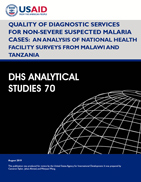
Abstract:
Global malaria diagnostic and treatment
guidelines recommend that every suspected
malaria case be tested, every confirmed case
be treated, and the disease tracked by
surveillance systems. The process of
diagnosis is initiated by a suspicion of
malaria on the basis of a defined set of
clinical criteria, with the most notable
symptom being fever. For optimal treatment,
an accurate diagnosis is therefore essential.
While there is clear guidance for the
diagnosis for non-severe suspected malaria
cases, providers at health facilities do not
always follow these recommended steps. This
report investigates the quality of diagnostic
services for non-severe suspected malaria
cases, using the observation of sick child
consultations and the exit interview of
caretakers from the 2013-14 Malawi Service
Provision Assessment (SPA) and the 2014-15
Tanzania SPA, which are nationally
representative health facility surveys.
We identified essential clinical care
elements that should be performed for all
non-severe suspected malaria cases that are
also available in the SPA surveys. These
included: 1) provider asked about fever; 2)
child was felt for temperature, had
temperature taken with a thermometer, or
checked for pallor by looking at palms; and
3) provider instructed child to see another
provider or laboratory for a finger or heel
stick for blood testing. Among non-severe
suspected malaria cases, 34% in Malawi and
25% in Tanzania received all three elements
of diagnostic clinical care. We assessed the
client/visit-, provider-, and facility-level
factors that might explain variations in the
quality of diagnostic services of non-severe
suspected malaria cases, using multilevel
random-effects logistic regressions, for
Malawi and Tanzania separately. In both
Malawi and Tanzania, the age of child,
malaria endemicity/seasonality, and
facilities having adequate supplies for
diagnostic testing were significant factors
for children receiving all three elements of
quality of care. In both countries, these
findings show the importance of malaria
service readiness for providing high quality
of care for febrile children. Having
facilities with diagnostic capabilities will
help ensure that providers adhere to malaria
diagnostic guidelines.
